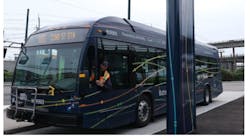Canada commits funding to help transit systems transition to electric power
The government of Canada has committed C$2.75 billion (US$2.17 billion) over the next five years toward helping transportation providers transition to electric power. The funding is part of the C$14.9 billion (US$11.73 billion) in dedicated transit investment announced in February.
“Better public transit, cleaner air, quieter streets and a planet safe for our kids–that’s the goal of our investment in zero-emission buses across Canada,” said Canada Minister of Infrastructure and Communities Catherine McKenna. “By making this investment, we’re tackling climate change while creating good jobs and supporting manufacturing right now, here at home. Canada’s infrastructure plan invests in thousands of projects, creates jobs across the country and builds cleaner, more inclusive communities.”
The federal funding is in addition to the C$1.5 billion (US$1.18 billion) the Canada Infrastructure Bank has committed to zero-emission buses and associated infrastructure as part of its three-year Growth Plan. The newly announced funding will start in 2021 and, according to the Canadian government, “support municipalities, transit authorities and school boards with transition planning, increase ambition on the electrification of transit systems and deliver on the government’s commitment to help purchase 5,000 zero-emission buses over the next five years.”
The government explains Canada’s transportation sector accounts for 25 percent of the country’s greenhouse gas emissions. The country’s existing programs have supported the purchase of 300 zero-emission buses, including 15 new battery-electric buses for TransLink in Vancouver, British Columbia, which was funded in part from the federal Gas Tax Fund and 65 electric buses in Guelph, Ontario, which was funded in part through the Investing in Canada Infrastructure Program.
Additionally, Toronto Transit Commission announced last fall its fleet of 60 all electric buses represents the largest on-road electric bus fleet in North America.
The government of Canada believes investing in cleaner transit networks will not only reduce emissions, but increase ridership, as well as incentivize and accelerate zero-emission bus adoption.
Canadian Urban Transit Association President and CEO Marco D’Angelo said the announcement represents a significant step toward lower transit emissions while also recognizing the country’s electric bus industry as a world leader.
“With this assistance, transit systems can take more climate action while creating and supporting good Canadian jobs,” said D’Angelo. “Canada’s electric bus manufacturing sector is among the world’s most advanced. But the cost of vehicles is not the only expense in electrification as transit systems need the charging infrastructure the buses require.”
Canadian Urban Transit Research & Innovation Consortium (CUTRIC), which is part of a partnership on zero-emission bus research and is leading a hydrogen fuel cell development project, among other efforts, believes transit agencies and municipalities “are ready for electrification.”
“Today’s investment by the federal government will allow transit agencies across the country to expedite the decarbonization of our transit systems to meet Canada’s ambitious climate goals,” said CUTRIC President and CEO Dr. Josipa Petrunic. “Zero-emission buses will benefit Canadians by creating manufacturing and energy jobs in the low-carbon economy, while also transporting Canadians in a way that is safe, green, healthy and sustainable.”

Mischa Wanek-Libman | Group Editorial Director
Mischa Wanek-Libman is director of communications with Transdev North America. She has more than 20 years of experience working in the transportation industry covering construction projects, engineering challenges, transit and rail operations and best practices.
Wanek-Libman has held top editorial positions at freight rail and public transportation business-to-business publications including as editor-in-chief and editorial director of Mass Transit from 2018-2024. She has been recognized for editorial excellence through her individual work, as well as for collaborative content.
She is an active member of the American Public Transportation Association's Marketing and Communications Committee and served 14 years as a Board Observer on the National Railroad Construction and Maintenance Association (NRC) Board of Directors.
She is a graduate of Drake University in Des Moines, Iowa, where she earned a Bachelor of Arts degree in Journalism and Mass Communication.







